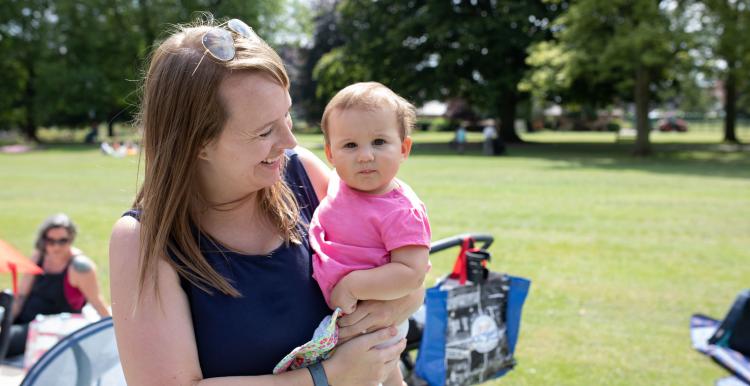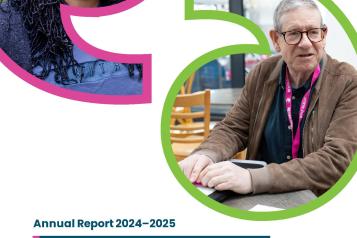Where can I go for support for my mental health as a parent?

Your mental health is important, both for your wellbeing and your child’s. It’s important that you feel supported throughout your journey of becoming a parent and have a safe space to talk about how you are feeling.
Take a look at the information below to find out where you can go to get the support you and your family need.
Are mental health problems common during and after pregnancy?
Yes, you are not alone in how you feel.
NICE guidelines say that depression and anxiety are the most common mental health problems during pregnancy, with around 12% of women experiencing depression and 13% experiencing anxiety at some point; many women will experience both. Depression and anxiety also affect 15‑20% of women in the first year after childbirth.
How will my mental health be affected during pregnancy?
How your mental health is affected during pregnancy depends on many things. These include:
- The type of mental illness you have had already.
- Stopping medication for a mental health problem - you have a high risk of relapse if you do this when you become pregnant. This is more likely if you have had a severe illness, several episodes of illness or a recent episode.
- Recent stressful events in your life (such as a death in the family or a relationship ending).
- How you feel about your pregnancy - you may or may not be happy about being pregnant.
- Upsetting memories about difficulties in your own childhood.
What is a maternal mental health issue?
-
Perinatal Depression. Lots of people are aware of postnatal depression but may not know that it can start in pregnancy. Mothers may experience low mood, numbness and feelings of indifference or hostility towards their baby.
-
Perinatal Anxiety. Anxiety could be experienced alongside depression or on its own. Symptoms include feeling dizzy, a churning stomach and restlessness.
-
Perinatal Obsessive Compulsive Disorder (OCD). This is a type of anxiety disorder involving obsessions and compulsions that are likely to relate to feelings about being a parent and your baby.
-
Postpartum Psychosis. This is a rare but serious mental health condition that needs urgent treatment. Symptoms such as delusions and hallucinations can start suddenly.
-
Postpartum PTSD. Trauma before, during or after birth could result in flashbacks and intrusive thoughts.
For more information, on signs and symptoms see the MIND website.
How has Covid-19 affected maternal mental health?
The Maternal Mental Health Alliance has found that the pandemic has affected women more than men and pointed to women and families experiencing socioeconomic deprivation, and women and families of colour, being the most affected.
Less access to formal and informal support systems has made it difficult to seek help for some people.
Where to get support
Action on Postpartum Psychosis (APP)
Information and support on postpartum psychosis, including an online chatroom and peer support network.
Visit the APP website.
Anxiety UK
Organisation run by with anxiety disorders, offering information, support and therapies for people experiencing anxiety.
Helpline: 08444 775 774.
Visit the Anxiety UK website.
B-EAT
Eating disorders charity providing information, support, local groups and an online chatroom.
Helpline: 0845 634 1414.
Visit the B-EAT website.
Best Beginnings
Free NHS-accredited Baby Buddy app offering evidence-based information and self-care tools to help parents during pregnancy and early stages of parenting.
App users also have access to a confidential, text-based Crisis Messenger which provides 24/7 support for new and expectant parents who are feeling extremely anxious or overwhelmed.
Maternal Mental Health Alliance
Raising awareness of maternal mental health issues. They organise and promote the awareness week.
Visit the MMHA website
Maternal OCD
Maternal OCD is a voluntary organisation dedicated to raising the profile of obsessive-compulsive disorder (OCD) for mothers.
Call the OCD Action helpline on 0845 390 6232 or 0207 253 2664.
Visit the Maternal OCD website
MIND
Mental health charity providing information, support, local groups and an online chatroom.
Call 0300 123 3393.
Visit the MIND website.
PANDAS
Helpline, social media and other support for parents with perinatal depression.
Call 0808 1961 776
Visit the PANDAS website
Tommy's
Providing advice for parents in the perinatal period, they have produced The Wellbeing Plan, endorsed by NICE, that helps you start thinking about how you feel emotionally and what support you might need in your pregnancy and after the birth.
If you're in a crisis and need urgent help:
If you don't feel you can keep yourself safe right now, seek immediate help by visiting your nearest Accident & Emergency (A&E) department or call 999.
If you need urgent support but don't want to go to A&E:
-
call Samaritans on freephone 116 123 – they're always open and are there to listen
-
contact your GP surgery and ask for an emergency appointment
-
contact NHS 111
- visit Mind's website for more information
Talk to your health professional
During pregnancy, you can talk to your midwife, GP or health visitor at any time if you're worried about your mental health. They should ask if you have ever had problems with your mental health in the past, and whether you have been bothered by feeling down, hopeless or unable to enjoy things lately.
Don't be afraid to tell your midwife or health visitor how you're feeling. This can help them to identify if you are unwell or might become unwell.
Questions to ask about mental health problems in pregnancy and the year after birth
Knowing the right questions to ask can be difficult, particularly when you are feeling worried or stressed. Take a look a these questions put together by NICE to help you discuss your condition or the treatments you have been offered.


